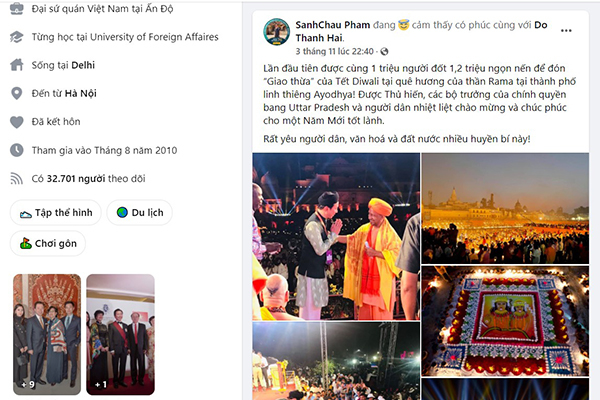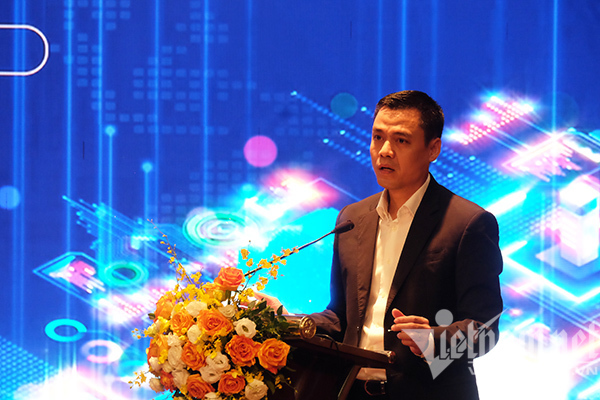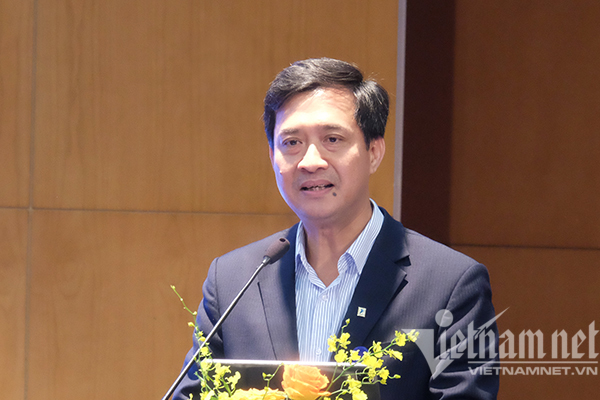 |
|
The Facebook page of the Vietnamese Ambassador to India Pham Sanh Chau with over 30,000 followers. |
Speaking at a conference to promote the use of digital platforms in foreign information work, Deputy Minister of Foreign Affairs Dang Hoang Giang said that the diplomatic sector has used social networks such as Facebook, Twitter and digital platforms for external relations and external information.
"The diplomacy sector has used Facebook and Twitter accounts, portals of diplomatic representative agencies, even social media accounts of ambassadors to perform foreign information work," he said.
As a result, Vietnam's foreign information work has obtained positive achievements, creating a spillover effect and gradually forming public diplomacy.
Vietnam's diplomatic sector has also been very active in applying digital technology in its activities. During the year Vietnam assumed the ASEAN Chairmanship, and the ASEAN Summit was held online for the first time in its history.
As many as 30 regular press conferences of the Spokesperson of the Ministry of Foreign Affairs have been held online. At the 13th National Party Congress, the initiative to establish an Online Press Center helped to provide information and create positive public opinion about Vietnam's image.
Vietnam Day was recently organized online for the first time in Vietnam and Switzerland. Online conferences to help connect domestic and international businesses are also held by Vietnamese representative agencies abroad.
 |
|
Deputy Foreign Minister Dang Hoang Giang. Photo: Trong Dat |
The heads of Vietnamese representative missions in some countries have taken initiative in using social networks to share information. One of the most successful examples is the Vietnam Embassy Delhi fanpage of the Vietnamese Embassy in India.
According to Nguyen Hong Sam, General Director of the Government Portal, as of 2020, leaders of 189 countries are officially present on Twitter. The Heads of State and Government of 163 countries, foreign ministers of 120 countries have personal Twitter accounts. As of June 1, 2020, there were 1,089 Facebook fan pages of state agencies and world leaders with more than 620 million followers. This shows that digital communication - including digital diplomacy - is effectively used by politicians from other countries.
Deputy Minister Dang Hoang Giang said that the digital transformation in Vietnam's external information work is still not organized methodically and there is no strategy, orientation, motto, and specific point of view to implement this work. This poses an urgent need for the Vietnamese diplomatic sector to rapidly transform digitally to catch up with the times.
How to apply digital transformation in diplomatic activities?
Nguyen Van Thuat, Deputy Director of the Department of External Information (Ministry of Information & Communications), said this agency is promoting many activities to carry out digital transformation in external information work.
The Ministry of Information and Communications is working on an external information management system to serve the measurement and evaluation of the performance of press agencies, television channels, and on the Internet. This is to serve scanning, collecting and analyzing international public opinion in cyberspace about Vietnam in foreign languages.
 |
| Nguyen Nam Long - Deputy General Director of Vietnam Posts and Telecommunications Group (VNPT). Photo: Trong Dat |
The Ministry of Information and Communications will also create applications that integrate external information databases to promote Vietnam's image in cyberspace. The ministry is also considering a plan to promote the production of digital content using software that automatically translates into many languages.
“Digital Diplomacy” is a new form of public diplomacy that uses the Internet, information and communication technology (ICT) and social media as tools to strengthen foreign relations.
Sharing from the perspective of an expert in digital transformation, Nguyen Nam Long - Deputy General Director of Vietnam Posts and Telecommunications Group (VNPT) - said that "digital diplomacy" is being adopted by many countries around the world to improve the efficiency of diplomatic and foreign affairs activities.
The main difference between “digital diplomacy” and classical public diplomacy is the greater ability to access to information, more interaction, and more transparency. Social networks such as Twitter, Facebook, Instagram, and YouTube have provided a platform for unconditional communication and have become the most powerful tool in external information and external relations.
Some countries like the US, UK and India have used social networking technologies and mobile apps to enhance communication in the digital environment and connect with citizens abroad.
In addition, digital tools are used by many countries to promptly grasp the world situation, deploy activities to support citizens abroad when necessary, and disseminate information about diplomatic events, policies to the people.
To promote digital transformation in the field of diplomacy, Nguyen Nam Long suggested that the Ministry of Foreign Affairs promote the construction of digital infrastructure, build an ecosystem of platforms for digital government such as document management, public servant management, reporting, public service portal, meeting management, paper digitization, citizen communication, and electronic passport.
In addition, the diplomatic sector needs to develop a digital data ecosystem to digitize archived records and invest in information security as well as apply technological solutions such as social listening, virtual assistants to collect and process data. This is the best way to apply the benefits of digital transformation to the operation of this sector.
Trong Dat

Digital transformation - an urgent solution in smart manufacturing
Digital transformation is no longer a goal but an imperative action of businesses, especially of manufacturing businesses.